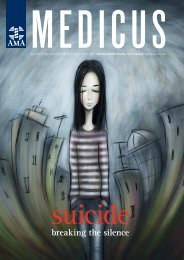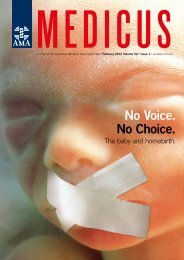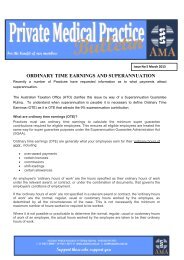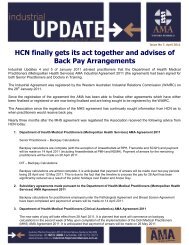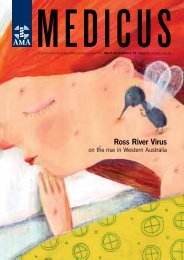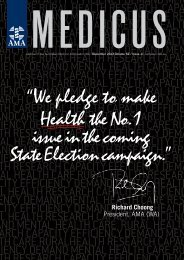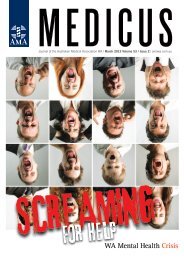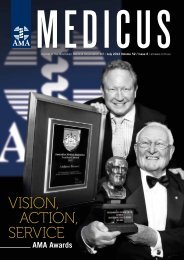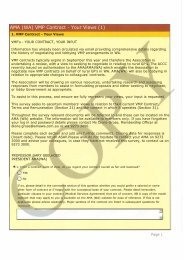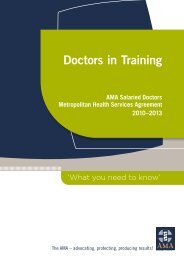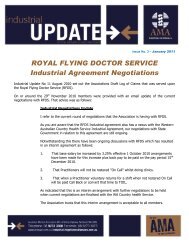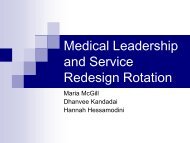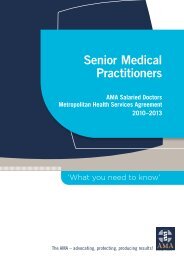twrama 1841_august_2.. - AMA WA
twrama 1841_august_2.. - AMA WA
twrama 1841_august_2.. - AMA WA
You also want an ePaper? Increase the reach of your titles
YUMPU automatically turns print PDFs into web optimized ePapers that Google loves.
OPINION<br />
to assess and coordinate complex childhood issues?<br />
As usual the answer lies in training programs and adult<br />
learning principles. As a core requirement of Australian<br />
vocational training, general practice registrars are required<br />
to complete a hospital paediatric rotation or an emergency<br />
department rotation with a significant paediatric caseload.<br />
In addition, community-based paediatric exposure and<br />
experience is required. There is an expectation that registrars<br />
will gain experience in the management of acute and chronic<br />
childhood illness.<br />
The 2011 RACGP Curriculum for General Practice has<br />
specific statement chapters on children and young people’s<br />
health, as well as other chapters describing acute serious<br />
illnesses and the management of chronic disease illness<br />
applicable to both the child and the adult. The Red Book<br />
provides age-specific guidelines for preventative activities in<br />
general practice and the Colle ge recently released a Children<br />
and Young People’s Health position statement (well worth<br />
a read).<br />
At the end of the day, a learning experience for a doctor<br />
reflects the clinical situation, the learner, and the supervisor/<br />
mentor/teacher/vocational educational program. Although I<br />
am not a huge fan of a log book, perhaps we need to revisit<br />
the concept.<br />
In summary, general practice can support optimal<br />
healthcare and development of children and young adults<br />
through:<br />
• Provision of a “medical home”<br />
• Ensuring we practice evidence-based preventive health<br />
activities<br />
• Ensuring access to appropriate medical attention for acute<br />
healthcare<br />
• Delivering systems of care (developmental surveillance<br />
and screening) to optimise and support bio-psycho-social<br />
development of children; and<br />
• Co-ordinating the health, social and education sectors<br />
with the united purpose to improve health and early<br />
childhood development.<br />
References:<br />
www.racgp.org.au/curriculum<br />
Position paper “The role of general practice in the provision of healthcare to<br />
children and young adults” available at www.racgp.org.au/policy/clinical.<br />
FREE<strong>AMA</strong> (<strong>WA</strong>) Seminar for GPs<br />
The next GP Breakfast Seminar, hosted by the clarification on how GPs could confidently provide<br />
Australian Medical Association (<strong>WA</strong>), will be PCEHR under the current Medicare arrangements.<br />
held on Wednesday 26 September.<br />
Attendees will also be given updates on item<br />
Naturally, the Personally Controlled Electronic number compliance, and <strong>AMA</strong> GP advocacy<br />
Health Record (PCEHR) will be top of the list of and policy.<br />
discussion points. The <strong>AMA</strong> will discuss why the Date: Wednesday 26 September 2012<br />
biggest element of health reform now confronting Time: 7am–8.30am<br />
GPs – the PCEHR – is being undermined by potential Venue: To be advised<br />
legal hazards and financial disincentives, its impact on RSVP: Wednesday 19 September 2012<br />
GPs and patients and what you can do about it. To register, contact Skye Connor. E-mail<br />
The seminar will update you on the<br />
skye.connor@amawa.com.au; phone 9273 3028;<br />
implementation pitfalls, their legal and financial fax 9273 3073.<br />
implications, including the Federal Minister’s recent<br />
August MEDICUS 33




